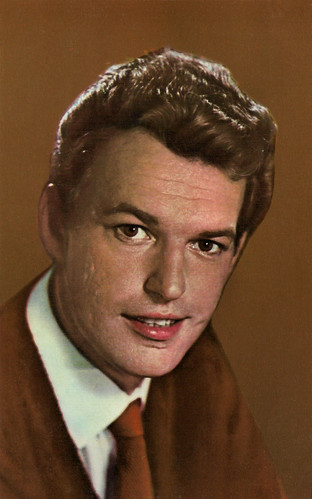
Soviet-Russian postcard by Izdanije Byuro Propogandy Sovietskogo Kinoiskusstva, no. A 093467, 1968. This postcard was printed in an edition of 200,000 cards. Retail price: 8 Kop.
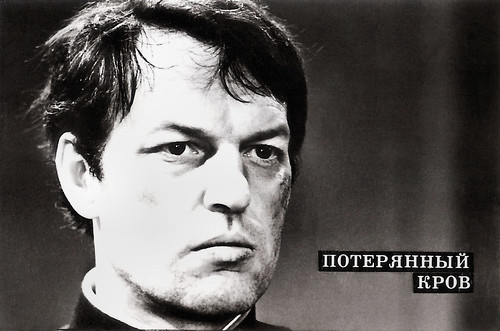
Soviet collectors card. Photo: publicity still for Sodybu tustejimo metas/The time of the homestead retreat (Almantas Grikevicius, 1976).
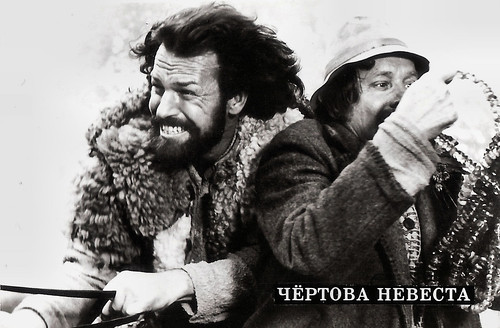
Soviet collectors card. Photo: publicity still for Velnio nuotaka/Cërtova nevesta/Devil's Bride (Arunas Zebriunas, 1973).
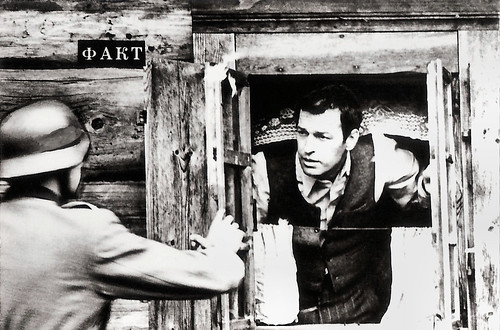
Soviet collectors card. Photo: publicity still for Faktas/Facts (Almantas Grikevicius, 1981).
A Lithuanian Jesus Christ Superstar rock opera
Regimantas Vaiksutovitch Adomaitis was born in Šiauliai, Lithuania in 1937. He graduated from the Faculty of Physics and Mathematics at Vilnius University. Later he studied acting at the acting department of the Vilnius Conservatory.
He made a debut in the theatre and had engagements in Vilnius, Kaunas and Kapsukas. His film debut was Vienos dienos kronika/The Chronicle of one Day (Vytautas Zalakevicius, 1963) with Donatas Banionis.
In 1966 he had his breakthrough with Niekas nenorėjo mirti/Nobody Wanted to Die (Vytautas Žalakevičius, 1966). This action drama is set in a small Lithuanian farming community after the Second World War. The village is divided as the communists battle those in favour of national independence. When the leader of the community is killed, the man's four sons, including Adomaitis, set out to avenge his death. Adomaitis, director Vytautas Žalakevičius and cinematographer Jonas Gricius were awarded the USSR State Prize for the film in 1967.
That year, he also acted in the a-typical Soviet war film Vostochny koridor/Eastern Corridor (Valentin Vinogradov, 1966) with Lyudmila Abramova. In the historical drama Sergey Lazo (Aleksandr Gordon, 1968), he played the title role of the Communist leader Lazo.
Adomaitis appeared as Edmund in the Soviet Shakespeare adaptation Korol Lir/King Lear (Grigori Kozintsev, Iosif Shapiro, 1971), starring Juri Jarvet. The Russian composer Dmitri Shostakovich composed the score. Jugu Abraham at IMDb: “Kozintsev is one of least sung masters of Russian cinema. His cinema is very close to that of Tarkovsky and Sergei Paradjanov. Kozintsev's Lear is not a Lear that mourns his past and his daughters - his Lear is close to the soil, the plants, and all elements of nature. That's what makes Kozintsev's Shakespearean works outstanding.”
In 1973, Adomaitis appeared in the Soviet drama Eto sladkoe slovo - svoboda!/That Sweet Word: Liberty! (Vytautas Žalakevičius, 1973). The film was shot in Chile shortly before the 1973 Chilean coup d'état. The basis for the plot is a real story: the escape from San Carlos prison in Venezuela of three political prisoners. The film was entered into the 8th Moscow International Film Festival where it won the Golden Prize.
Velnio nuotaka/Cërtova nevesta/Devil's Bride (Arūnas Žebriūnas, 1974) is the first Lithuanian musical about the victory of love over the trickery of the Devil based on the book Baltaragio malūnas (Whitehorn Mill) by Kazys Boruta. Due to its popularity, it is sometimes called a Lithuanian Jesus Christ Superstar rock opera.

Soviet-Russian postcard by Izdanije Byuro Propogandy Sovietskogo Kinoiskusstva, no. M-31293 9/IV-68. This postcard was printed in an edition of 150,000 cards. The retail price was 8 kop.
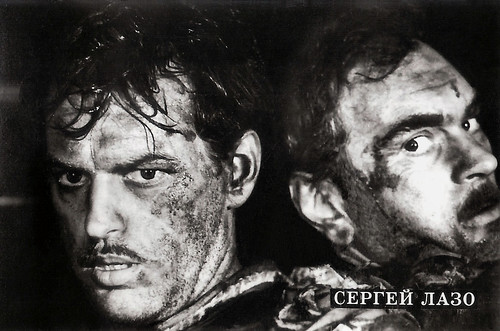
Soviet collectors card. Photo: publicity still for Sergey Lazo (Aleksandr Gordon, 1968).
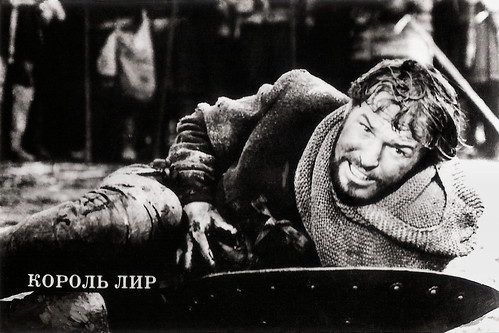
Soviet collectors card. Photo: publicity still for Korol Lir/King Lear (Grigori Kozintsev, Iosif Shapiro, 1971).
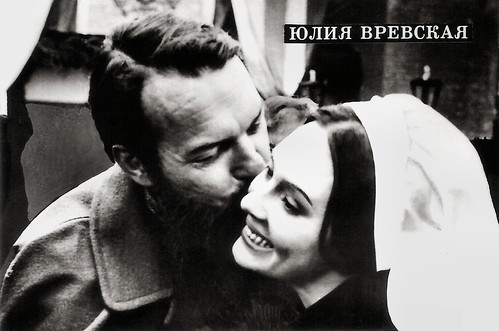
Soviet collectors card. Photo: publicity still for Yuliya Vrevskaya (Nikola Korabov, 1978) with Lyudmila Saveleva.
Power House
In East-Germany, Regimantas Adomaitis starred in Wolz - Leben und Verklärung eines deutschen Anarchisten/Wolz - Life and Illusion of a German Anarchist (Günter Reisch, 1974) with Heidemarie Wenzel. Tom Dooley at IMDb: “Part comedy at one point, part political statement and a definite swipe at National Socialism, it is very ambitious and it pulls it all off. It has a great musical score too and the music adds to the moods tenfold. The acting is superb and Regimantas Adomaitis as Wolz is a powerhouse.”
For the DEFA, he also starred in Mann gegen Mann/Man Against Man (Kurt Maetzig, 1976). In the historical drama Yuliya Vrevskaya/Between the Tsar’s Court and the Battlefield (Nikola Korabov, 1978), Adomaitas played opposite Lyudmila Saveleva and Stefan Danailov.
Other films were the Maxim Gorky adaptation Vrag/Enemies (Rodion Nahapetov, 1978) with Innokentiy Smoktunovskiy, the Soviet-Italian drama La vita è bella/Life Is Beautiful (Grigoriy Chukhray, 1979) with Giancarlo Giannini and Ornella Muti, and Poloska neskoshennych dikikh tsvetov/A strip of unclosed wildflowers (Yuri Ilyenko, 1980).
He returned to East-Germany for the drama Die Verlobte/The Fiancee (Günter Reisch, Günther Rücker, 1980) with Jutta Wachowiak as a woman sentenced in 1934 to ten years in prison for antifascist activities. The love between her and her fiancée enables her to survive it.
He co-starred again with Donatas Banionis in the Soviet Lithuanian-language war film Gruppa krovi nol/Faktas/Facts (Almantas Grikevicius, 1981). At the 1981 Cannes Film Festival, actress Yelena Solovey won the award for Best Supporting Actress for her role in the film.
Other films include Iz zhizni otdykhayushchikh/Life on Holidays (Nikolay Gubenko, 1981), Skrydis per Atlanta/The Flight Across the Atlantic Ocean (Raimondas Vabalas, 1984), Es ist nicht leicht ein Gott zu sein/It’s Hard to Be a God (Peter Fleischmann, 1989), the war drama Angely smerti/Angels of Death (Yuriy Ozerov, 1993), with Fedor Bondarchuk and Powers Boothe, and the French-Russian drama Tu es.../You are… (Vladimir Makeranets, 1995).
On TV, he appeared in the Soviet musical miniseries Trest, kotoryy lopnul/The Trust That Went Bust (Aleksandr Pavlovsky 1983) based on short stories by O. Henry. In 1985, Regimantas Adomaitis was a member of the jury at the 35th Berlin International Film Festival. Adomaitis has received many awards of recognition.
In 1988 he and 34 other prominent people, created the Sąjūdis Reform Movement, which eventually led to the declaration of independence of Lithuania on 11 March 1990. From then on, Adomaitis lived in Vilnius, the capital of Lithuania, where he worked as an actor at the Lithuanian National Drama Theatre and regularly appeared in TV series. Among his later films were the Norwegian drama Iskyss/The Ice Kiss (Knut Erik Jensen, 2008) with Ellen Dorrit Petersen, and the drama Anton (Zaza Urushadze, 2019).
Regimantas Adomaitis died in 2022 in Vilnius, Lithuania. He had been married to singer Eugenia Baerite, who died in 2011. They had three children, including actor Gediminas Adomaitis.
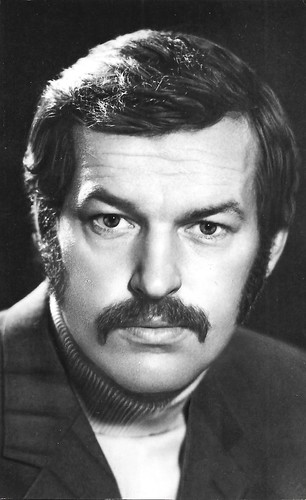
Former Sovietunion postcard by Ykrreklamfilm YRF, Kiev, 3-1-1978.
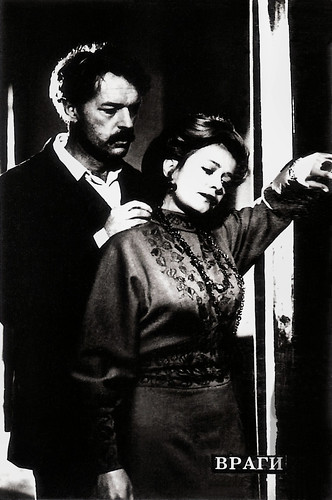
Soviet collectors card. Photo: publicity still for Vragi/Enemies (Rodion Nahapetov, 1979) with Elena Solovey.
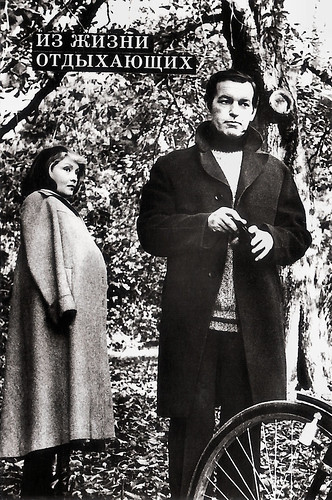
Soviet collectors card. Photo: publicity still for Iz zhizni otdykhayushchikh/Life on Holidays (Nikolay Gubenko, 1981) with Zhanna Bolotova.

Soviet-Russian postcard. Photo B. Plotnikova.
Sources: Jugu Abraham (IMDb), Tom Dooley (IMDb), Roman A. Ivanov (IMDb), Mubi, AllMovie, Wikipedia and IMDb.
No comments:
Post a Comment